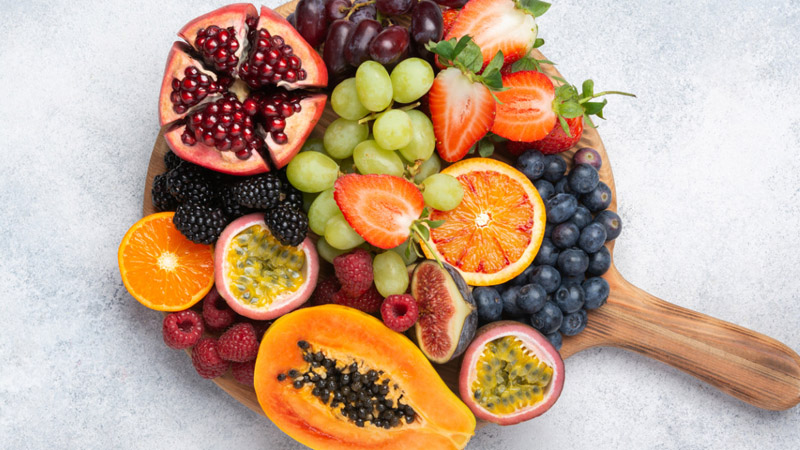Exploring the Healthiest Fruits and Their Benefits for a Balanced Diet

(iStock)
Government guidelines advocate for fruits and vegetables as dietary staples, yet only a small fraction of adults consume the recommended daily amount of fruit. Packed with essential nutrients, fiber, vitamins, and antioxidants, fruits play a crucial role in preventing chronic diseases and enhancing overall health.
Among the plethora of nutritious fruits, blueberries stand out for their significant health benefits attributed to anthocyanins, antioxidants that may reduce the risk of heart disease, and type 2 diabetes, and enhance cognitive abilities.
Strawberries, rich in vitamin C, are known for their potential to lower inflammation and improve cholesterol levels. Raspberries, with their high fiber content, along with magnesium, potassium, and vitamin C, offer health benefits including disease prevention. Avocados, often celebrated for their healthy fats, contribute to heart health and may aid in weight management.
Watermelon, known for its hydrating properties, contains l-citrulline, which can alleviate muscle soreness post-exercise. Dates, with their low glycemic index, support brain and gut health without spiking blood sugar levels. Prunes are recognized not only for digestive health but also for their positive impact on bone density. Kiwis, offering more than the daily requirement of vitamin C, are linked to improved sleep, digestion, and mood.
Cherries are associated with better sleep quality and reduced inflammation, while bananas provide a range of nutrients including potassium and vitamin B6. Apples, with their fiber and antioxidants, contribute to heart health and blood pressure regulation. Grapefruits, rich in vitamin C, support skin health and may have anti-cancer properties, though caution is advised when consumed with certain medications.
Pomegranates protect against UVB rays and offer a range of health benefits from improved memory to reduced blood pressure. Pears, high in fiber, promote digestive health and metabolic well-being. Blackberries, known for their antiviral properties, also support insulin sensitivity. Mangoes, rich in carotenoids, enhance vision and may protect against cancer.
Diversity in fruit consumption is key to reaping the broad spectrum of health benefits they offer. Whole fruits, especially those without added sugars, are the healthiest choices. While concerns about fruit sugars exist, the natural sugars in fruit differ significantly from added sugars in processed foods, making fruits a beneficial part of a balanced diet. For weight management, the fiber in fruits aids in satiety and gut health, making them a conducive choice for maintaining a healthy weight.
Top 15 healthiest fruits
Strawberries
Just 8 of these ruby red gems will score you all the vitamin C you need in a day. Vitamin C is an antioxidant involved in immune function and collagen production. There’s also evidence that strawberries may reduce markers of harmful inflammation and improve total and LDL cholesterol among people with high baseline levels.
Raspberries
A cup of raspberries has 8 grams of the 25 to 38 grams of fiber recommended daily. It also supplies key nutrients like magnesium, potassium, and vitamin C. They’re also high in ellagic acid and quercetin, antioxidants that protect your cells from disease-causing damage.
Avocado
Although we often eat them as a heart-smart fat, avocados are technically a fruit. Much of their fat is monounsaturated, a type predominant in extra virgin olive oil, a staple of the ultra-healthy Mediterranean diet. One study found that replacing some of the carbohydrates in a meal with either a half or whole avocado was associated with several improvements in markers of heart health among overweight and obese individuals.
Watermelon
Watermelon may taste sweet, but a cup of this juicy fruit has less natural sugar than the same portion of many other fruits, including blueberries. Watermelon and 100% watermelon juice are notable for a compound called l-citrulline, which has been shown to reduce muscle soreness after exercising. Watermelon is also a good choice after a workout since it’s about 90% water. Each cup supplies about five ounces of water, so it can help on the hydration front.
Dates
One thing that makes dates so special is they’re sweet and caramel but have no added sugar and are low on the glycemic index. Dates make our list of the healthiest fruits because they’ve been associated with impressive benefits, including supporting brain and gut health. Additionally, a small study among people with type 2 diabetes found that dates may help lower total cholesterol and raise healthy HDL cholesterol without impacting blood sugar levels.
Prunes
Many people think of prunes for their impact on digestive health, but their effect on bone health is worth mentioning, too. One study found five to six prunes per day preserved bone mass among postmenopausal women, while those skipping this daily habit experienced a decline in bone mass.
Kiwi
In addition to supplying more than 100% of your daily vitamin C requirement, kiwis may support better sleep, digestion, and mood. A wide range of nutrients, antioxidants, and bioactive substances are thought to be related to kiwi’s health benefits.
Cherries
Like kiwis, cherries have the potential to help you sleep better. Studies also indicate that cherries may help reduce inflammation and oxidative stress factors involved in initiating and promoting numerous chronic illnesses. Eating cherries may also reduce exercise-induced muscle soreness.
Bananas
Bananas get a bad rap, but we consider them one of the healthiest fruits because they have a slew of nutrients, including fiber, potassium, copper, magnesium, and vitamin B6. They also get extra points for being portable, convenient, and naturally sweet.
Apples
An apple a day really may keep the doctor away. In addition to supplying fiber, apples contain potent antioxidants. Daily intake of this fruit has been shown to lower blood pressure, total cholesterol, unhealthy LDL cholesterol, and inflammation status while increasing good HDL cholesterol and supporting healthy endothelial function — a metric of how well your blood vessel lining is performing.
Grapefruit
The vitamin C in grapefruit helps promote collagen production, which supports skin health and helps prevent wrinkling and sagging skin. This antioxidant also supports healthy immune functioning. This juicy fruit may also be a great weapon against cancer. Compounds in grapefruit may have anti-cancer properties and studies on vitamin C suggest that people with high intakes have lower incidences of numerous cancers, including bladder, breast, lung, pancreatic, and prostate cancer.
However, eating grapefruit while taking certain prescription medications may cause serious health problems, so check with your doctor or pharmacist before eating grapefruit if you’re taking prescription drugs.
Pomegranate
Chemical compounds in this fruit act as an internal sunscreen, protecting you from UVB rays. Other potential benefits from consuming pomegranate and its juice include improved memory, protection against cancer, reduced blood pressure, and less post-workout muscle soreness and fatigue.
Pears
The high fiber content in pears promotes digestive health, blood sugar control, heart health, and weight management. Plus, evidence suggests that eating two pears each day improves metrics of metabolic health among people with metabolic syndrome.
Blackberries
In addition to being rich in fiber, compounds in blackberries have antiviral and antibacterial properties that target the germs associated with cavities and gum disease. Additionally, evidence suggests that blackberries may help promote insulin sensitivity and protect against obesity.
Mangoes
Carotenoid compounds give mangoes their golden color, and they’re also related to mangoes’ health benefits. Two of these nutrients — lutein and zeaxanthin — promote better vision, while a third, mangiferin, protects against cancer. Early research also suggests this nutrient may help reduce acne.
Best fruits to eat daily
Berries will give you a lot of bang for the buck, but you don’t want to eat the same fruit on repeat for the rest of your life! Fruits vary in the types and amounts of nutrients they supply, but they all have superpowers. So it’s best to eat a variety of fruits to benefit from the spectrum of protective substances they provide. Most people could benefit from adding more fruit to their diets, and while we’ve listed some of the healthiest fruits to prioritize, it’s a good idea to eat a range of fruits throughout the week.
This story first appeared on TODAY.com


